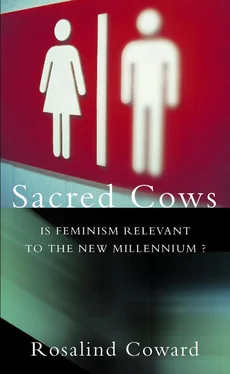IS FEMINISM RELEVANT
TO THE NEW MILLENNIUM?

ACKNOWLEDGEMENTS ACKNOWLEDGEMENTS INTRODUCTION 1 THE ASSAULT ON UNEARNED MALE POWER 2 FEMINISM: A MOVEMENT BLIND TO ITS OWN EFFECTIVENESS 3 A NEW GENDER LANDSCAPE 4 THE FULL MONTY 5 MALE LOSS 6 MASCULINITY: FROM POTENCY TO ABSURDITY 7 MASCULINITIES 8 SEARCHING FOR THE HERO INSIDE OF US 9 WOMANISM 10 THE ‘MASCULINIST’ REACTION 11 WHIPPING BOYS 12 THE REDUNDANT FATHER 13 MOTHERING AND FEMALE COMPLICITY 14 THE BOY CHILD 15 VULNERABLE OPPRESSORS 16 POTENT VICTIMS CONCLUSION BIBLIOGRAPHY INDEX About the Author Copyright About Publisher Page
This book would not have been written without the support and encouragement of certain friends and colleagues. In particular I would like to acknowledge the institutional support given by University College, Northampton and the personal and intellectual support of George Savona of the same institution. Without blaming them, I would like to thank the following people: Karen Binks, Karen Selby, Judy Holder, and Tessa Adams. Jo Dobry, Julian LeVay and Ann McFerran deserve especial thanks for their refusal to let me give up on the project. I would like to acknowledge Barbara Taylor for her ongoing contribution to formulating some of the ideas and more specially for her collaboration with an original version of the chapter, Whipping Boys. Ruth Glaser also gave practical support at a critical moment. I would also like to acknowledge various editors at the Guardian, especially David Rowan, David Leigh and Sally Weale for giving me space to develop ideas and sometimes for ruthlessly challenging them. I owe thanks to Michael Fishwick at HarperCollins and Antony Goff at David Higham Associates for their incredible patience. I would also like to thank my Mother for her continuing support and her invaluable cuttings service. Finally I would like to thank John Ellis. Quite simply, without his support this book would never have been written.
Title Page Sacred Cows IS FEMINISM RELEVANT TO THE NEW MILLENNIUM?
ACKNOWLEDGEMENTS ACKNOWLEDGEMENTS ACKNOWLEDGEMENTS INTRODUCTION 1 THE ASSAULT ON UNEARNED MALE POWER 2 FEMINISM: A MOVEMENT BLIND TO ITS OWN EFFECTIVENESS 3 A NEW GENDER LANDSCAPE 4 THE FULL MONTY 5 MALE LOSS 6 MASCULINITY: FROM POTENCY TO ABSURDITY 7 MASCULINITIES 8 SEARCHING FOR THE HERO INSIDE OF US 9 WOMANISM 10 THE ‘MASCULINIST’ REACTION 11 WHIPPING BOYS 12 THE REDUNDANT FATHER 13 MOTHERING AND FEMALE COMPLICITY 14 THE BOY CHILD 15 VULNERABLE OPPRESSORS 16 POTENT VICTIMS CONCLUSION BIBLIOGRAPHY INDEX About the Author Copyright About Publisher Page This book would not have been written without the support and encouragement of certain friends and colleagues. In particular I would like to acknowledge the institutional support given by University College, Northampton and the personal and intellectual support of George Savona of the same institution. Without blaming them, I would like to thank the following people: Karen Binks, Karen Selby, Judy Holder, and Tessa Adams. Jo Dobry, Julian LeVay and Ann McFerran deserve especial thanks for their refusal to let me give up on the project. I would like to acknowledge Barbara Taylor for her ongoing contribution to formulating some of the ideas and more specially for her collaboration with an original version of the chapter, Whipping Boys. Ruth Glaser also gave practical support at a critical moment. I would also like to acknowledge various editors at the Guardian, especially David Rowan, David Leigh and Sally Weale for giving me space to develop ideas and sometimes for ruthlessly challenging them. I owe thanks to Michael Fishwick at HarperCollins and Antony Goff at David Higham Associates for their incredible patience. I would also like to thank my Mother for her continuing support and her invaluable cuttings service. Finally I would like to thank John Ellis. Quite simply, without his support this book would never have been written.
INTRODUCTION
1 THE ASSAULT ON UNEARNED MALE POWER
2 FEMINISM: A MOVEMENT BLIND TO ITS OWN EFFECTIVENESS
3 A NEW GENDER LANDSCAPE
4 THE FULL MONTY
5 MALE LOSS
6 MASCULINITY: FROM POTENCY TO ABSURDITY
7 MASCULINITIES
8 SEARCHING FOR THE HERO INSIDE OF US
9 WOMANISM
10 THE ‘MASCULINIST’ REACTION
11 WHIPPING BOYS
12 THE REDUNDANT FATHER
13 MOTHERING AND FEMALE COMPLICITY
14 THE BOY CHILD
15 VULNERABLE OPPRESSORS
16 POTENT VICTIMS
CONCLUSION
BIBLIOGRAPHY
INDEX
About the Author
Copyright
About Publisher Page
Feminism has been a dramatically successful social movement. It has utterly changed what women can expect from, or do with, their lives. It has also transformed when men expect from sharing their lives with women and how they will behave towards them. Children growing up now simply take for granted feminism’s messages about sexual equality and justice when only thirty years ago such messages were widely opposed as extremist and threatening to the social order. No other social movement has so rapidly revolutionized such deeply held patterns of behaviour. The problems faced by feminism now have nothing to do with getting its ideas across and everything to do with how to face up to the unpredictable consequences of this success.
Paradoxically, however, as an increasing number of feminists reach ever more powerful positions, they seem determined to breathe new life into the original tenets of feminism, insisting that female oppression is just as real now as ever before. In the UK and America there are powerful feminists in government who call on the female populace to back them up in a continuing struggle. ‘At last’, they seem to say, ‘you have someone to take up your cause, to fight for women’s rights. And what a hard fight it will be because nothing has really changed.’ Recently I told a well-known, highly paid woman novelist the sub-title of this book: ‘Is feminism relevant to the new millennium?’ ‘Of course it is,’ she said without missing a beat. ‘We still don’t have equal pay.’ Everywhere, powerful women repeat this mantra. Even Germaine Greer now says nothing has really changed. Influential feminists insist that because there are still many individual areas of injustice or unfairness, there is still an overarching system of sexual injustice with men always advantaged and women disadvantaged. One injustice, like the inequality which exists between the average pay of women and the average pay of men, is supposed to prove the rest. But this is no longer true in any simple way. Of course, women still suffer many injustices, discriminations and sometimes even outrages but it is no longer a simple coherent picture of male advantage and female disadvantage.
There are many social practices and attitudes which still discriminate against women. I encounter this regularly in my own life as a journalist and in the media. In these areas, men still tend to dominate. They are still more interested in each other and in each other’s interests than in women – a sort of unconscious marginalization which women have long noticed in business. It is still more difficult for older women or intellectual women than it is for older or intellectual men. While this is galling, it is not part of a coherent picture of male domination and female subordination as it once was. At least now there are many women working in the media. Some are not simply successful but very powerful, such as Rosie Boycott, editor of the Daily Express. In some areas of the media, to be young and female is a definite advantage; in the late 1990s the fashion has been for female newsreaders. It would be wrong to suggest male domination is the most significant unfairness. Now the dominance of the media by a certain class, certain families even, and the absence of ethnic minorities are much more striking. There are now different unfairnesses coming from different places and causes. When gender is significant, it is not always women who are disadvantaged.
Читать дальше













